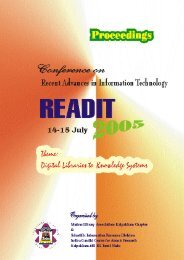READIT-2007 - Indira Gandhi Centre for Atomic Research
READIT-2007 - Indira Gandhi Centre for Atomic Research
READIT-2007 - Indira Gandhi Centre for Atomic Research
Create successful ePaper yourself
Turn your PDF publications into a flip-book with our unique Google optimized e-Paper software.
In<strong>for</strong>mation Resource Management in a<br />
Knowledge Society<br />
V. Rajendran* and E. Soundararajan *<br />
Abstract<br />
Digital Libraries have to serve the needs of knowledge society where the organizational<br />
knowledge, individual knowledge and other resources of knowledge have to be managed and<br />
disseminated. Librarians who have been the traditional in<strong>for</strong>mation resource managers have a vital<br />
role to play in this context. They are responsible <strong>for</strong> in<strong>for</strong>mation resource management in effective and<br />
efficient way. In<strong>for</strong>mation resources management includes the basic infrastructure management,<br />
underlying technology, standards and protocols, access models and finally the user management which<br />
is the ultimate purpose of any knowledge management process. This paper highlights essential aspects<br />
of in<strong>for</strong>mation resource management with a special reference to <strong>Indira</strong> <strong>Gandhi</strong> centre <strong>for</strong> <strong>Atomic</strong><br />
<strong>Research</strong> (IGCAR) environment.<br />
1. INTRODUCTION<br />
In<strong>for</strong>mation is an important resource in the “Knowledge Society” and its<br />
management is very different from traditional Library management. Mostly, it<br />
involves management of change, time and electronic sources, along with traditional<br />
collection management aspects. In<strong>for</strong>mation resource management is a philosophical<br />
and practical approach to managing in<strong>for</strong>mation. Because in<strong>for</strong>mation is a valuable<br />
resource to be managed like other resources, IRM contributes directly to<br />
accomplishing organizational goals and objectives. It provides an integrated approach<br />
to managing the entire life cycle of in<strong>for</strong>mation—from creation, to dissemination, to<br />
archiving or destruction—so as to maximize the overall usefulness of in<strong>for</strong>mation.<br />
Forest W. Horton (1979) one of the leading experts in the area of IRM, defines<br />
“Resource Management system includes all methods and procedures <strong>for</strong> collecting<br />
and processing in<strong>for</strong>mation on a particular resource (i.e. men, money, machines, or<br />
what is germane to our subject here, in<strong>for</strong>mation itself) and <strong>for</strong>matting that data in a<br />
manner which is useful <strong>for</strong> management”.<br />
The most comprehensive definition offered by Horton in his book<br />
“In<strong>for</strong>mation resources management: harnessing in<strong>for</strong>mation assets <strong>for</strong> productivity<br />
gains in office, factory and laboratory” (1985) states that IRM is:<br />
“a managerial discipline which views in<strong>for</strong>mation as a resource equal to<br />
financial, physical, human, and natural resources. IRM addresses the efficient and<br />
effective handling of in<strong>for</strong>mation resources (raw data) and the resulting in<strong>for</strong>mation<br />
assets (knowledge)”.<br />
There are at least three events which, when combined together, triggered the<br />
inception of IRM. The main events are:<br />
* Scientific In<strong>for</strong>mation Resource Division, <strong>Indira</strong> <strong>Gandhi</strong> <strong>Centre</strong> <strong>for</strong> <strong>Atomic</strong> <strong>Research</strong>, Kalpakkam<br />
Tamilnadu -603 102. Email: vraj@igcar.gov.in<br />
61

















